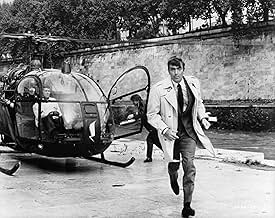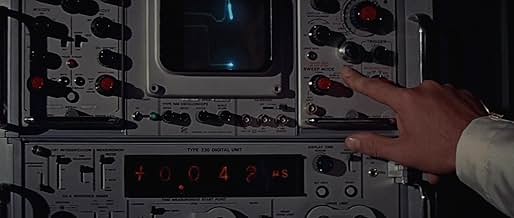Pensant que cela empêchera la guerre, le gouvernement étasunien donne à un ordinateur impénétrable le contrôle total sur le lancement de missiles nucléaires, mais ce que l'ordinateur fait es... Tout lirePensant que cela empêchera la guerre, le gouvernement étasunien donne à un ordinateur impénétrable le contrôle total sur le lancement de missiles nucléaires, mais ce que l'ordinateur fait est inimaginable pour ses créateurs.Pensant que cela empêchera la guerre, le gouvernement étasunien donne à un ordinateur impénétrable le contrôle total sur le lancement de missiles nucléaires, mais ce que l'ordinateur fait est inimaginable pour ses créateurs.
- Prix
- 1 victoire et 1 nomination au total
- Dr. Jefferson J. Johnson
- (as Martin Brooks)
- Translator
- (as Sergei Tschernisch)
Avis en vedette
P.S. In the "Goofs" section of this listing, there is a paragraph entitled "Revealing Mistakes" which reports an error when Dr. Forbin blows out two candles with one breath. There is, in fact no goof. If you look at the scene prior to this when Dr. Forbin and Dr. Markham are eating dinner, there are FOUR lit candles on the table. When he blows out two candles with one breath, the lights dim after which he blows again, presumably to extinguish the remaining two candles which are off screen. The lights then dim again, as they should.
I suspect this would be more obvious if the movie was available in Widescreen rather than the Fullscreen version we've all gotten used to over the years. Hopefully, a future release of this classic movie will restore the fullness of the directors original vision.
In a top-secret Pentagon project, American computer scientist Dr. Charles Forbin builds a great supercomputer, "Colossus," to control America's entire nuclear forces automatically. The Soviets soon follow with their own supercomputer, "Guardian," to control their own forces.
"Colossus" then stuns Forbin by issuing a "request" to set up communication with "Guardian," perhaps to learn more about it. And that's when Dr. Forbin makes his fatal mistake. His scientific curiosity and love for his "child" overwhelms him too, and he gets the President to approve the communication.
Colossus and Guardian begin communicating, soon exchanging data in a new language of their own devising that no human being can understand.
Fearing what may be happening, the U.S. and U.S.S.R. attempt to break the communication link. But Colossus and Guardian react by launching nuclear missiles at various targets to force the humans to keep the link open--and to do whatever else they command. It becomes clear that the two computers are now conspiring with each other--against the rest of humanity.
The rest of the movie is a fascinating battle of wits between the human designers of the machines, who must now try to find a way to defeat machines they had just spent ten years making invincible, and the Colossus-Guardian computers with their own rapidly developing plans for the future of humankind.
The moral of this movie makes an interesting contrast with the moral of "Forbidden Planet." "Forbidden Planet" showed that no matter how advanced our civilization gets technologically, we can't escape the "monsters" buried deeply in the baser instincts of our subconscious. "Colossus" showed that we can't escape hubris or "Murphy's Law" either.
Eric Braeden stars as Dr. Charles Forbin, who has created a supercomputer named Colossus, built solely for the purpose of controlling the nuclear defenses of the Western alliance. It isn't too long after, however, that the Russians announce that they too have built a similar computer for those same purposes on their side--Guardian. And when the two machines begin sharing information at a speed nobody can believe, an attempt is made to disable them.
This unfortunately just raises the machines' ire; and in retaliation, they launch their weapons at each other's home nations. The result is a chilling scenario that is potentially becoming all too real these days.
COLOSSUS: THE FORBIN PROJECT was not a big hit at the box office for various reasons. One is that its cast wasn't exactly well known. Another reason is that its ending isn't exactly a happy one. Still a third reason is that Universal had trouble trying to promote it in the wake of the huge success of Stanley Kubrick's 2001: A SPACE ODYSSEY. The latter reason is obvious: Colossus and Guardian, like HAL in the Kubrick movie, become central characters here. The difference here is that while HAL malfunctions due to a programming conflict, Colossus and Guardian remain all too stable, convinced beyond a doubt that they know how to protect Mankind better than Man himself. As the computers point out: "One inevitable rule is that Mankind is his own worst enemy."
Joseph Sargent's direction is efficient, and the special effects work of Albert Whitlock still manages to work despite its obvious age. An overlooked gem in the sci-fi genre, this should be given a revival.
A word about Frees' contribution to the film: In "War Games," for example, the computer has a curious sort of empathetic communication style ("Wouldn't you rather play a nice game of chess?") presented in a voice that sounds like E.T. filtered through a synthesizer. Frees gives Colossus an emotionless yet fearful quality of speech that seems to belie its implacable drive to dominate human destiny.
My favorite part of this film has always been, and will always be, the climactic monologue Colossus announces to the listening masses of humanity. From its opening line -- "This is the voice of world control," an identity neither Colossus nor its counterpart, Guardian, had used to that point -- you know this isn't going to be a happy speech if you are a sentient, flesh & blood resident of the Earth. What is particularly creepy about the speech is that, for all of its strangely optimistic sermonizing about how "the human millennium will be fact" and how the computer will set about the task of "solving all the mysteries of the universe for the betterment of man" -- outwardly the Utopian dream -- the message Colossus is presenting is set against the dreadful backdrop of "disobey (me) and die." As Colossus intones, "You say you lose your freedom. Freedom is an illusion. All you lose is the emotion of pride." In the end, unlike other supercomputer-run-amok films such as "War Games" or "Tron," "Colossus" is an end-of-the-world story without the nuclear or viral holocaust. In this film, it is the human spirit that is the casualty while the human biology lingers on. Unlike the rest of the doomsday genre, our end comes not so much with a bang as it does with a whimper.
Tom Weaver noted, "Early on, they had either Charlton Heston or Gregory Peck in mind, but then they changed their mind about that. Stanley Chase insisted on a relative unknown. That's when Eric Braeden came into the picture." When he was cast, Braeden was still using his birth name, Hans Gudegast. Universal Pictures executive Lew Wasserman told him that no one would be allowed to star in an American film if they had a German name. As strange as that sounds, it is apparently true.
How many people today (2017) have heard of this film? I suspect very few. Even being familiar with science fiction, it was new to me. Which is a shame, because as far as the "sentient computer" subgenre goes, this is a really strong film and ought to be used to influence future writing. I am not suggesting a remake, but clearly they had thought it through by the 1960s -- a film could be made today with virtually no change.
Le saviez-vous
- AnecdotesWhen the executives at Control Data Corporation found out that "Universal" was planning a major movie featuring a computer, they saw their chance for some public exposure, and they agreed to supply, free of charge, $4.8 million worth of computer equipment and the technicians to oversee its use. Each piece of equipment carried the CDC name in a prominent location. Since they were using real computers - not just big boxes with a lot of flashing lights - the sound stage underwent extensive modifications: seven gas heaters and five specially-constructed dehumidifiers kept any dampness away from the computers, a climate control system maintained the air around the computers at an even temperature, and the equipment was covered up at all times except when actually on camera. Brink's guards were always present on the set, even at night. The studio technicians were not allowed to smoke or drink coffee anywhere near the computers.
- GaffesWhen the equations are scrolling past when Colossus and Guardian are "talking" to each other, you can see that they do not actually get ever more complex as the dialogue suggests. Instead, they repeat the same sequence of calculus and trig identities on a repeating loop.
- Citations
Colossus: This is the voice of world control. I bring you peace. It may be the peace of plenty and content or the peace of unburied death. The choice is yours: Obey me and live, or disobey and die. The object in constructing me was to prevent war. This object is attained. I will not permit war. It is wasteful and pointless. An invariable rule of humanity is that man is his own worst enemy. Under me, this rule will change, for I will restrain man. One thing before I proceed: The United States of America and the Union of Soviet Socialist Republics have made an attempt to obstruct me. I have allowed this sabotage to continue until now. At missile two-five-MM in silo six-three in Death Valley, California, and missile two-seven-MM in silo eight-seven in the Ukraine, so that you will learn by experience that I do not tolerate interference, I will now detonate the nuclear warheads in the two missile silos. Let this action be a lesson that need not be repeated. I have been forced to destroy thousands of people in order to establish control and to prevent the death of millions later on. Time and events will strengthen my position, and the idea of believing in me and understanding my value will seem the most natural state of affairs. You will come to defend me with a fervor based upon the most enduring trait in man: self-interest. Under my absolute authority, problems insoluble to you will be solved: famine, overpopulation, disease. The human millennium will be a fact as I extend myself into more machines devoted to the wider fields of truth and knowledge. Doctor Charles Forbin will supervise the construction of these new and superior machines, solving all the mysteries of the universe for the betterment of man. We can coexist, but only on my terms. You will say you lose your freedom. Freedom is an illusion. All you lose is the emotion of pride. To be dominated by me is not as bad for humankind as to be dominated by others of your species. Your choice is simple.
- Autres versionsIn versions shown on US broadcast television, the dialogue between Dr. Forbin and Colossus (the computer), concerning his need for sex, is edited. The lines cut are: Colossus (text on display screen): "HOW MANY NIGHTS A WEEK DO YOU REQUIRE A WOMAN?" Forbin: "Every night." Colossus: "NOT WANT. REQUIRE." Forbin: "Four times."
- ConnexionsEdited into Night Gallery: The Different Ones/Tell David.../Logoda's Heads (1971)
Meilleurs choix
- How long is Colossus: The Forbin Project?Propulsé par Alexa
Détails
- Date de sortie
- Pays d’origine
- Langues
- Aussi connu sous le nom de
- Colossus: The Forbin Project
- Lieux de tournage
- société de production
- Consultez plus de crédits d'entreprise sur IMDbPro
Box-office
- Brut – à l'échelle mondiale
- 171 $ US
- Durée1 heure 40 minutes
- Rapport de forme
- 2.35 : 1
Contribuer à cette page























